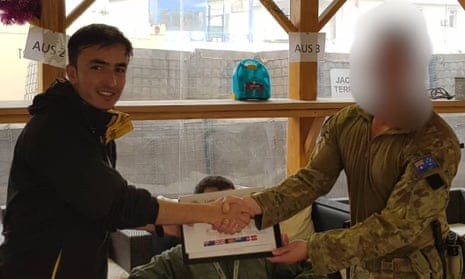Afghans have begun arriving in Australia after being granted a safe haven for their work alongside Australian troops in Afghanistan amid intensifying violence across the war-torn country.
Guardian Australia has confirmed that about 80 Afghan interpreters and their families have landed in Australia on commercial flights since Thursday. The news was first reported by SBS.
In April, Guardian Australia reported that 41 interpreters had written to the government twice earlier this year pleading for urgent help.
It is understood most of the people listed on the letter are among those who have been able to escape the deteriorating situation in Afghanistan, including Tariq Zia who is in hotel quarantine in Melbourne.
“I am safe now [and] I am feeling well,” he told the Guardian. “I am alone and still concerned about my [extended] family [in Afghanistan].”

Nawidullah Aarman told the Guardian he worked with coalition forces as an interpreter for almost a decade in hostile environments across Afghanistan assisting special forces elements. He left Kabul on Friday and is expected to touch down in Australia on Saturday evening after a stopover in Dubai.
“We will not believe it until we are boarded in the plane,” he said. “We have some colleagues that received their visas and waited for their flight for a long time.”
Australia has been settling locally engaged employees as part of a special visa program since December 2012; more than 1,400 visas have been granted to eligible applicants and their family members at risk of harm because they helped Australia’s mission in Afghanistan.
The home affairs department said that since 15 April about 180 people in Afghanistan had been granted a visa under the Afghan locally engaged employees (LEE) program, including family members.
Afghanistan veteran and federal MP Phillip Thompson said interpreters were at “the top of the list” as the government expanded its efforts to process visa applications and provide a safe haven in Australia ahead of Nato force withdrawal in September.
“Interpreters are the only people on the refugee and humanitarian visa waitlist that have been allowed to enter the country during the global pandemic,” he said.
“But there are processes in place and avenues that people have to go through and we have to make sure these people were actually working for [Australia]. It’s really critical that this process is robust.”
The evacuations come amid backlash towards the federal government about the speed at which visa applications were being processed after it was announced its sudden closure of the Australian embassy in Kabul ahead of US forces withdrawing in September.
In regard to the flights, the home affairs said it was “urgently” processing visas but could not discuss specific information about the travel of Afghan LEE/humanitarian visa holders for their privacy and safety.
It is unclear if there are any further flights scheduled for those remaining.
It comes as fierce fighting between the Taliban and Afghan government forces intensifies, and reports of targeted attacks on Afghans who supported Australia’s mission with reports at least nine locally employed workers had been killed in recent days.
Thompson said the government was looking at “all options” to evacuate eligible Afghans and did not rule out the possibility of following the US who announced it would move interpreters and other Afghans who have worked for the US, along with their families, to a safe location as they wait for their visa applications to be processed.
“It’s not off the table but this is being discussed at the highest level and I know the federal government has been working with states and territories on how this will all work too,” Thompson said.
